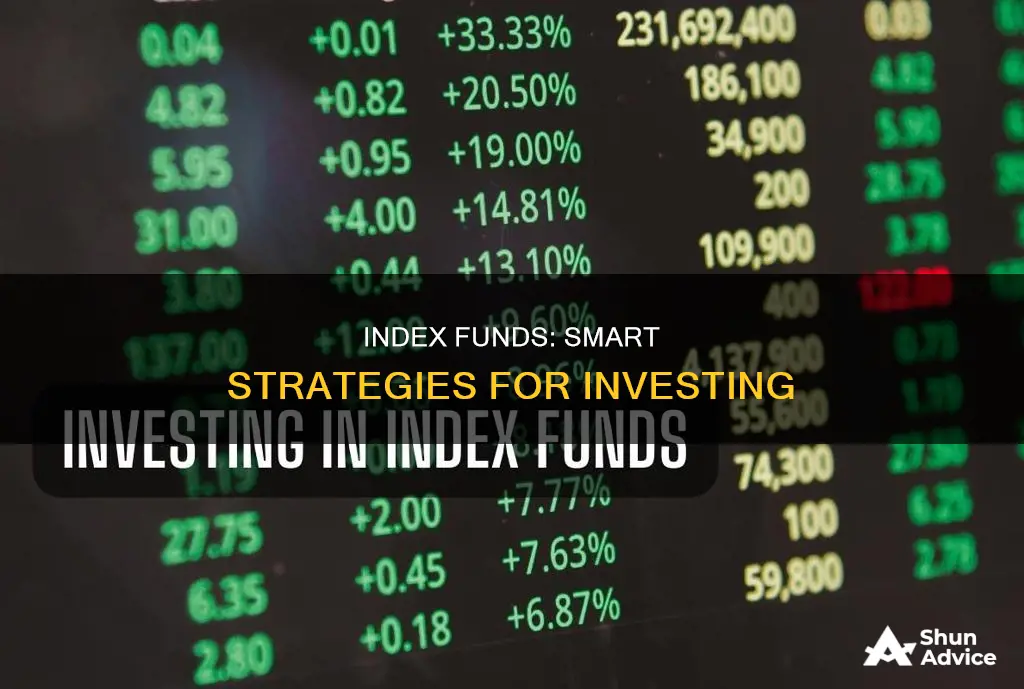
Index funds are a type of investment fund that tracks the performance of a market index, such as the S&P 500, by holding the same stocks or bonds, or a representative sample of them. They are designed to be a low-cost, passive investment strategy, meaning they don't have a fund manager actively picking stocks. This makes them an attractive option for investors looking for a simple, cost-effective way to gain exposure to a broad, diversified portfolio.
Index funds have become increasingly popular in recent years, with passive index funds making up about half of all U.S. fund assets in 2023. This is because they offer several benefits, including low fees, tax advantages, and low risk due to their diversified nature. However, one of the critiques of index funds is their lack of flexibility, as they are designed to mirror a specific market and cannot pivot when the market shifts.
When investing in index funds, it is important to consider factors such as the fund's performance history, management fees, and the index it tracks. It is also crucial to decide where to buy your index funds, whether through a brokerage or directly from a fund provider, and what type of account to use, such as a taxable brokerage account or a tax-advantaged retirement account.
| Characteristics | Values |
|---|---|
| --- | --- |
| Definition | A type of mutual or exchange-traded fund (ETF) that tracks the performance of a market index, such as the S&P 500, by holding the same stocks or bonds or a representative sample of them. |
| Benefits | Low fees, tax advantages, low risk, consistent performance, long-term growth potential, versatility, ease of use |
| Risks | Lack of flexibility, vulnerable to market downturns, potential for underperformance during bull markets |
| How to invest | 1. Research and analyse index funds; 2. Decide which index fund to buy; 3. Purchase your index fund |
| Where to buy | From a mutual fund company or a brokerage, or through a robo-advisor |
| Costs | Lower expense ratios than actively managed funds, typically less than 0.20% |
| Diversification | Easy to use index funds for broad portfolio diversification |
| Strategies | Dollar-cost averaging, rebalancing portfolio periodically |
| Alternatives | Direct indexing |
What You'll Learn

Index funds vs. individual stocks
Index funds are a type of investment fund that pools money from multiple investors and invests it in a diverse range of securities, such as stocks or bonds, with the goal of mirroring the performance of a specific market index, like the S&P 500 or the Dow Jones Industrial Average. On the other hand, investing in individual stocks means purchasing ownership in a specific publicly-traded company, with the potential for higher returns but also higher risk.
Advantages of Index Funds over Individual Stocks
Index funds offer broad diversification, reducing the risk associated with investing in a single company's stock. By investing in a variety of assets, index funds provide investors with a more stable option that can still deliver solid returns over the long term. Additionally, index funds are considered passive investments, requiring less active management and resulting in lower fees for investors. The simplicity of index funds makes them an attractive option for beginners and those seeking a more hands-off approach to investing.
Advantages of Individual Stocks over Index Funds
While investing in individual stocks may require more research and effort, it offers the potential for higher returns. If you have expertise in a particular industry or company, or if you are confident in your ability to analyse and predict market trends, investing in individual stocks can be lucrative. Individual stocks give you more control over your investments, allowing you to target specific companies or sectors that you believe will perform well.
Factors to Consider
When deciding between index funds and individual stocks, it's important to consider your investment goals, risk tolerance, and the amount of time and effort you're willing to dedicate to investing. Index funds are generally recommended for long-term wealth accumulation, providing stable returns with less volatility. On the other hand, investing in individual stocks can be riskier but may offer higher rewards if you're able to dedicate the time and energy to research and analysis.
Pension Funds: Exploring Real Estate Investment Opportunities
You may want to see also

Index funds' advantages
Index funds are a great investment option for those looking to build wealth over time. Here are some advantages of investing in index funds:
Low Costs and Fees
Index funds are passively managed, meaning they don't require active fund managers to pick stocks. As a result, they have much lower management fees than other funds. Index funds also have lower transaction costs since they hold investments for the long term and don't frequently trade. These lower costs can significantly impact your returns over time.
Tax Advantages
Index funds are more tax-efficient than other investments. They generate less taxable income and, due to their buy-and-hold strategy, incur lower capital gains taxes. Additionally, index funds can choose which lots to sell when selling securities, allowing them to minimize taxes by selecting those with the lowest capital gains.
Diversification and Reduced Risk
Index funds provide instant diversification by allowing you to invest in a basket of stocks or bonds that mirror a specific market index. This diversification reduces the risk associated with individual stocks, as your investment isn't tied to the performance of a few companies. Instead, it tracks the broader market or a specific sector, depending on the index chosen.
Strong Historical Performance
Index funds have consistently outperformed actively managed funds over the long term. This is largely due to their low costs and passive investment strategy. By tracking well-known indexes like the S&P 500, Dow Jones Industrial Average, or Nasdaq Composite, index funds offer investors a simple way to achieve solid returns.
Ease of Use
Index funds are straightforward investment options, especially for beginners. You don't need to be an expert in financial markets or spend time researching individual stocks. Simply choose an index fund that aligns with your investment goals, and you can benefit from the performance of the underlying index.
Index funds offer a simple, cost-effective way to invest in the stock market and build wealth over time. Their advantages include low costs, tax efficiency, diversification, strong historical performance, and ease of use. However, it's important to remember that they are subject to market risks and may lack the flexibility of actively managed funds.
Index Funds: Short-Term Investment Strategy or Long-Term Gain?
You may want to see also

Index funds' disadvantages
Index funds are a popular investment choice due to their potential for stable long-term returns, diversification, and low fees. However, they have some disadvantages that investors should be aware of before proceeding. Here are the key disadvantages of investing in index funds:
- Lack of Downside Protection: Index funds do not provide a floor to losses. When the market or index drops, the index fund will also plunge, and investors are vulnerable to downside risks.
- Lack of Reactive Ability: Index funds do not allow investors to take advantage of market opportunities. If a stock becomes overvalued, it carries more weight in the index, but investors cannot reduce their exposure to that stock.
- No Control Over Holdings: Investors in index funds have no control over the individual holdings in the portfolio. They cannot add or remove specific companies they prefer or want to avoid.
- Limited Exposure to Different Strategies: Index funds may not provide access to diverse investment strategies. While they offer diversification, this can also be achieved with a smaller number of carefully selected stocks.
- Moderate Annual Returns: Due to the large number of assets held by a single index fund, the potential for significant annual returns may be diluted.
- Fewer Opportunities for Short-Term Growth: Index funds are typically long-term investments with slower gains compared to individual stocks, options, crypto, or other higher-risk investments.
- No Chance of Beating the Benchmark: Index funds are designed to match the market's performance or a specific benchmark index. They do not provide an opportunity for investors to outperform the market.
- Short-Term Downside Risk: Index funds can be volatile, especially during economic downturns or poor stock market performance.
- Diversification Trade-offs: The diversification of an index fund can be a trade-off. Investors may end up owning stocks they would rather avoid while missing out on others they prefer.
- Tax-Cost Ratio: Owning an index fund may trigger capital gains taxes if held outside tax-advantaged accounts such as a 401(k) or IRA, impacting overall investment returns.
Bond Fund Basics: Strategies for Investing Wisely
You may want to see also

How to invest in index funds
Index funds are a passive investment strategy that tracks a market index such as the S&P 500 or the Dow Jones Industrial Average. They are a great way to build wealth over time and are popular with retirement investors.
- Have a goal: Before investing, it is important to know what you want your money to do for you. Index funds are a good option if you are looking to let your money grow slowly over time, especially if you are saving for retirement.
- Research index funds: Once you know which index you want to track, look at the different index funds available. Consider factors such as company size and capitalization (small-, mid- or large-cap indexes), geography, business sector or industry, asset type, and market opportunities.
- Pick your index funds: When choosing an index fund, cost is an important factor. Index funds are cheap to run because they are automated, but don't assume that all funds are cheap. Compare the management costs of different funds with the same investment goal.
- Decide where to buy your index funds: You can purchase an index fund directly from a mutual fund company or a brokerage. Consider factors such as fund selection, convenience, trading costs, impact investing, and commission-free options when choosing a provider.
- Open an investment account: To purchase shares of an index fund, you will need to open an investment account. A brokerage account, individual retirement account (IRA), or Roth IRA will all work.
- Buy shares: With your account funded, you can now buy shares of your chosen fund through the provider's website or app.
- Keep an eye on your index funds: Monitor your index funds over time to ensure they are performing as expected. Check that the index fund is mirroring the performance of the underlying index and review the fees to ensure they are not too high.
Remember, investing in index funds, like any other investment, carries risks. There is a chance of losing money, especially during economic downturns or sector-specific challenges. However, index funds offer a simple, low-cost way to build wealth over time.
Best Funds to Invest in Today for Maximum Returns
You may want to see also

Index funds vs. active funds
Index funds are a type of investment fund that tracks a market index, such as the S&P 500 or the Nasdaq Composite. They are designed to mirror the performance of the index as closely as possible, and they generally invest in all the components of the index they track. On the other hand, active funds are hand-picked by professional money managers, who aim to beat the market returns and outperform the benchmark index.
How They Work
Index funds are passively managed, meaning they require less work than actively managed funds. Index funds have lower management fees because they do not require a manager to actively trade or a research team to analyse securities and make recommendations. Instead, the index fund's portfolio duplicates that of its designated index. Index funds also tend to trade in and out of securities less frequently, which results in lower transaction costs and generates less taxable income.
Actively managed funds, on the other hand, involve a portfolio manager who actively selects investments based on their research and expertise. This hands-on approach aims to outperform the market but comes with higher fees and more taxable capital gains.
Performance and Risk
Over the long term, index funds have generally outperformed actively managed funds. This is because actively managed funds rarely beat the market, and even if they do, it is unlikely that they will consistently do so over time. Actively managed funds also tend to underperform the market, whereas index funds match it, bringing better returns to investors over time.
However, a potential drawback of index funds is that they rise and fall with their corresponding index. For example, if you invest in an index fund that tracks the S&P 500, you will be vulnerable to market downturns. In contrast, an actively managed fund might be able to buffer against market corrections by adjusting its positions.
Costs
Index funds have lower costs than actively managed funds due to their passive nature. Actively managed funds require more resources for research, fundamental analysis, investment strategies, and risk management, which results in higher total expense ratios (TERs). To outperform an index fund tracking the same benchmark, an actively managed fund must beat the benchmark by a margin higher than the difference in TERs.
Suitability
The choice between index funds and active funds depends on your investment goals and risk appetite. Index funds are suitable for those seeking a low-cost, passive investment strategy that mirrors the performance of a specific market index. On the other hand, active funds may be preferable for those who believe they can select fund managers who can consistently outperform the market and generate higher returns.
Investment Spending: Exploring the Diverse Sources of Funds
You may want to see also
Frequently asked questions
Index funds are a type of mutual or exchange-traded fund (ETF) that tracks the performance of a market index, such as the S&P 500, by holding the same stocks or bonds or a representative sample of them.
Index funds seek to match the performance of an underlying index they're tracking. For example, an S&P 500 index fund will hold the stocks that make up the S&P 500 index in an effort to match its performance.
Index funds are popular because they are easy to invest in, have low fees, and often perform very well. They are also a great way to build wealth over the long term.
Like any other investment, index funds have risks associated with broad market performance, economic conditions and geopolitical developments. There's also a risk associated with specific asset classes, such as US index funds, global index funds or index funds tracking a particular sector or industry.







